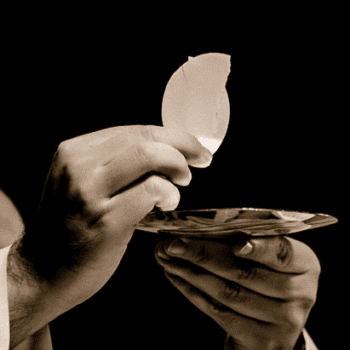SCANDAL
Woe to the world because of scandal! Scandals are sure to come,
but woe to him through whom they come! [Mt 18:7]
![So Jesus came out, wearing the crown of thorns and the purple robe. Pilate said to them, "Behold the man!" [John 19:5] Scandal.](https://wp-media.patheos.com/blogs/sites/1276/2020/01/EcceHomo-twin-black.png)
In 2018, the editor of a Patheos blog, “Sick Pilgrim,” asked me to write an article about my perseverance in faith in the face of the scandal of priests who abuse minors sexually and bishops who respond to that irresponsibly or not at all. Now that I have my own Patheos blog (Turn. Love. Repeat.), I am repeating the article here.
[From August 20, 2018]
Just days ago, the bad news broke that within the last seventy years or so in Pennsylvania, more than a thousand youngsters suffered sexual abuse from over three hundred Catholic priests and some church employees.
A week or two before that news broke, we were already reeling from learning that the career of Theodore McCarrick— priest, bishop, cardinal— bears the stains of his many sexual attacks on young men and seminarians, and that all along churchmen knew it.
Because of these things, many Catholics say their faith quakes and ebbs with feelings of sorrow, wrath and fear. I have those feelings, but find I am able to go on believing the Catholic Church, its identity, mission and teachings.
I did not say, “believing IN the Catholic Church.” Rather, I said, “believing the Catholic Church.” The difference there is great, necessary AND CATHOLIC.
The difference is present in the Creed we recite at Sunday Mass— but only in the Creed’s original Latin and Greek. Our English translation hides the difference. In the original Greek and Latin, the Creed says I believe IN God the Father, IN God the Son and IN God the Holy Spirit. IN each of the three DIVINE Persons! Then, in Greek and Latin, it says, “I believe the Church.” It does NOT say, as the English translation does, that I believe IN the Church.
I believe the “one, holy, catholic and apostolic Church.” It is holy not because of itself, but because it belongs to God who calls it into being. I do not believe IN it, for by itself the Church is not a divine person. One of the Three Divine Persons said he would build his Church on a human person. Speaking to Simon the son of Jona, God the Son said, “You are rock, and on this rock I will build my Church.” [Mt 16:18]
Human persons can still tell the truth while they are living a lie. In the Gospel, Jesus acknowledges this. “The scribes and the Pharisees sit on Moses’ seat; so, practice and observe whatever they tell you, but not what they do; for they preach, but do not practice.” [Mt 23:2-3]
There might or might not be helpful knowledge in some or all of that, but it is not the beginning of the story of my ability to go on believing the Church while I mourn, seethe and shudder over the hell-worthy wrongs that churchmen wreak.
But before I go on with my story, I want to say there must be no blame laid on those who can no longer believe after they have been scandalized. Scandal is a Greek word for a hunter’s snare or stumbling block. Jesus called down woe on the bringers of scandal— the predators who set out the snares and stumbling blocks. He did not call down woe on those whom the snares and stumbling blocks cause to fall.
Christian faith— Christian believing— is a theological virtue, a power only God can give. God never takes back the gift, but its receivers can forget or lose knowledge of how to use it; or they can become too frightened to go on using the gift, because its use brought on suffering that they were not humanly strong enough to bear. A scandal can break the human abilities of those who have received the divine gift of faith. Please blame the perpetrators of scandal— the hunters who lay out snares and stumbling blocks. Never blame their prey, those whom they have brought down, whom they have scandalized.
In the summer of 1981 I graduated from college, entered my monastery in the Order of Saint Benedict, and turned twenty-three a few weeks later. I look back on myself then as immature, naive, unrealistic and overly idealistic about the Church and monasticism. My 2018 self would never let my 1981 self join the monastery. But I have grown into it; and while some of my growth may be a good harvest, there are also stubborn weeds.
I entered dreaming I would enjoy all the monks as a sworn community of brotherly Christians who lived out their calling according to the exhortation we hear once a month at Vespers (Evening Prayer):
All of you should be like-minded, sympathetic, loving toward one another, compassionate, humble. Do not return evil for evil, or insult for insult; but, on the contrary, a blessing, because to this you were called, that you might inherit a blessing. [1 Pt 3:8-12]
Bubbles have burst. Bombs also. In my thirty-seven monastic years, I have seen that we monks are sometimes like swine trampling the pearls of our calling. The same is true in other monasteries. During my theological studies from 1987 to 1991, I lived in or visited other Benedictine monasteries in America and Europe. Around that time, the sensationalized movie version of Umberto Eco’s book, “The Name of the Rose,” came out. Seeing the movie and reading the book, I realized that I myself have seen each of Eco’s good and bad monks at some time in my own or another monastery.
It is one thing to learn of scandals elsewhere in the Church. It is quite another to live all day long, every day and for life in a monastery while suffering personally the scandals of unhealthiness or immaturity, mistakes, stupidity, mindlessness, neglect, irresponsibility, incompetence or outright wickedness from other monks, superiors or oneself. In monasticism there is no coming down off the cross, no residing off the parish property and no moving to a different parish. So, St. Benedict says in his regulations for monastic life: “Never sidestepping God’s teaching, but holding fast to his instruction in the monastery until death, we shall by patience take part in the sufferings of Christ that we may deserve to be sharers in his kingdom.” St. Benedict says later that monks “are to tolerate most patiently each other’s infirmities whether of body or behavior.”
I am not saying monks and monasteries are horror stories and nothing else. There is also good in monks and monasteries— but they are not immune from being human stories. Neither is the rest of the Church.
I believe the Church and its Creed when they say that Christ, God the Son, “came down from heaven … was incarnate … and became man.” Enfleshed and human— and not in some other, perfect version of this world and its real story.
I also believe the Church and its Creed when they say that Christ “suffered death and was buried.” Here! In this world, in this real world and because of it! Because of us! I believe the Church and its Creed that say so with the words “For us men and for our salvation he came down from heaven.” Not for angels or demons! That’s why that word “men” is there (though it’s a gender-neutral word in Latin and Greek). I believe the Church that says God in Christ personally took Full and Holy Communion in my real, human, broken world and its history.
I believe the Church and its Creed that say Christ, having “suffered death,” nonetheless “rose again on the third day.” Thus, in his own person he took what is human into a transcendent, true version or reversion of itself and this world, giving all a new true story. Though he rose bodily in everlasting triumph over death, he chose to do so not as healed bodily, but as still wounded, still open bodily to our still wounded, death-laden world. Bodily and spiritually, the Risen Wounded Christ is our bridge and communion in being “ascended into heaven” and “seated at the right hand of the Father.” I believe the Church’s Creed that says so.
Because I believe the Church that says all those things, I have reason to hope in Christ’s promise that I myself will join him in taking Full and Holy Communion in “the resurrection of the dead and the life of the world to come.”
I was baptized into Christ’s death and resurrection. I believe the Church, and so with the Church “I confess one Baptism.” Baptism into Christ’s death in this real world that still crucifies, baptism in the Name of the Father, and of the Son and of the Holy Spirit. I embrace that I am baptized, that is, dunked, into God’s Name, and so I embrace also that Christ names me his disciple— but with a warning: “Whoever does not bear his own cross and come after me, cannot be my disciple” [Lk 14:27].
So here I am in this world of the Cross. It is a scandal to me. It was a scandal to one of the wrongdoers dying on crosses next to that of Jesus: “Are you not the Christ? Save yourself and us!” [Lk 23:39].
Jesus, are you not the Christ? Save yourself and us from priests who rape children! Are you not the Christ? Save yourself and us from bishops who give wide berth to victims while Good Samaritan lawyers try to help victims get money that could pay for healing therapy!
The Scandal of the Christ is that God is Love fully open to the beloved— the world, the world he so loved— so that everything true and real right now in the beloved becomes baptized, that is, immersed in God, and God becomes baptized in all that is true and real right now in the beloved. Jesus— God— spoke to his disciples of his undergoing just such a baptism into suffering and death. “Are you able to drink the cup that I drink, or to be baptized with the baptism with which I am baptized?” [Mk 10:38]. God underwent baptism here, and not in some other, perfect version of his beloved world, because fully open, wholehearted Love does not sidestep the beloved.
I believe the Church. God is Love, “came down from heaven … was incarnate … and became man” here in this world that he loves as it is right now. Because of that, and because this world kills, “he suffered death.” By some logic not of this world, his suffering and death show that Christ is God and is Love. How else would Everlasting-Boundless-Love-Enfleshed be, except by embracing and joining fully the beloved in the beloved’s present lot?
How do I respond to the scandal of the Christ? How does he want me to respond? “If you would be perfect … come, follow me” [Mt 19:21]. He wants me to be as as vulnerably open as he is, to love as he loves. “Whoever does not bear his own cross and come after me, cannot be my disciple” [Lk 14:27].
Jesus, are you not the Christ? Can you not give me a different and better world, a different and better history?
Asking him those questions means asking him to dispense me from loving, from being like him. But how could he ever want that for me? If he ever did, then he would not be Love. Then I would still have this world in all its suffering, and I would have it with my heart tightened, hardened, shrunken and shut, and I would die one day, and become nothing, and that would be the end of the story forever.
Yet I have been baptized in his Name. I also am a Christ. Every baptized person is a Christ. I do solemnly swear that this is the scandal of the Christ, the whole Christ and nothing but the Christ: the Church, the Body of Christ. I also am the Church.
Christ scandalized the world by coming as a real human, real even unto death, and yet claiming to be God. He scandalized the world by sending his Church to speak and act for him— this all too human church.
So, I bear my own cross and follow Christ, follow Love, so I can be his disciple, Love’s disciple. Love who so loves this scandalous, scandalizing, scandalized world!
So, I believe the Church. With the Church— and as the Church— I say, “I confess one Baptism for the forgiveness of sins and I look forward to the resurrection of the dead and the life of the world to come.”
Amen.
Our Father who art in heaven!
Thy kingdom come!
Deliver us from evil!
Dear Readers of “Turn. Love. Repeat.”
California where I reside had a new law go into effect on January 1. California Assembly Bill 5 forbids freelance writers, editors and photographers from providing more than 35 content submissions to a media organization per year unless the organization hires the freelancer as a salaried employee. Patheos is a media organization, and I am a freelancer. So now I must limit my posts to 35 per year, or 1 post about every 10 days. So as not to exceed my limit here at Patheos, I will post my “extra” pieces at my own blog, Monk Notes.












